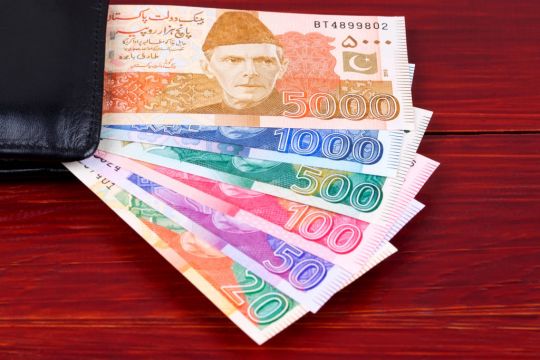Pakistanis living abroad sent 2.5 billion US dollars (£2 billion) home in March, responding to the cash-strapped government’s appeal for more hard currency remittances, the country’s central bank said on Monday.
The sum represents a 27.4% increase compared with February and is the highest in the past seven months, according to a tweet by the State Bank of Pakistan.
The announcement offers some hope for improving Pakistan’s ailing economy, officials said.
The remittances came mainly from Pakistanis living in the United States, Britain and the Middle East.
Workers’ remittances recorded an inflow of US$2.5 billion during Mar 23, indicating an increase of 27.4% over Feb 23. For details see https://t.co/rPOvn9Dr8N https://t.co/7XBd4uOcHC pic.twitter.com/Czrv9jaNsO
Advertisement— SBP (@StateBank_Pak) April 10, 2023
Pakistan is grappling with one of its worst economic crises, exacerbated by last summer’s devastating floods that killed 1,739 people, destroyed two million homes and caused 30 billion dollars (£24 billion) in damage.
The impoverished country has also been hit by a wave of violence, which last week prompted top political and military leaders to order new operations against the Pakistani Taliban, a militant group that is separate but allied with the Afghan Taliban.
The Pakistani Taliban have stepped up attacks on security forces since unilaterally ending a ceasefire with the government last November.
Pakistan is in the final phase of talks with the International Monetary Fund to secure a crucial instalment of a 1.1 billion dollar (£885 million) loan from a 6 billion dollar (£4.8 billion) bailout package.
The tranche has been on hold since December over Pakistan’s failure to meet the terms of a previous deal, signed in 2019 by then-prime minister Imran Khan.
#RoshanDigitalAccount holders can send their Zakat & Donations using #RoshanSamaajiKhidmat to support families across Pakistan. This Ramadan specially #donate for those who have been affected due to floods last year.
Details: https://t.co/MIA4Rx6931 pic.twitter.com/FdF1UwIYeL— SBP (@StateBank_Pak) March 20, 2023
Economists fear a failure to get the IMF loan would spark a surge in inflation. About 21% of Pakistan’s 220 million people live in poverty.
Prime Minister Shahbaz Sharif has blamed Mr Khan, now opposition leader, for much of the economic demise, saying the former cricket star turned Islamist politician violated the terms of the 2019 agreement with the IMF.
Mr Sharif has also asked his finance minister, Ishaq Dar, to forgo a trip to Washington on Monday for the annual meeting of the World Bank and the IMF because of the country’s dire economic crisis. Mr Dar will join the gathering virtually instead.
Mr Khan was ousted in a no-confidence vote in Parliament in April 2022 and has demanded Mr Sharif schedule early elections.
Total liquid foreign #reserves held by the country stood at US$ 9.76 billion as of March 31, 2023.
For details https://t.co/WpSgomnKT3 pic.twitter.com/gI1Yv9fYLr— SBP (@StateBank_Pak) April 7, 2023
In a speech to politicians on Monday, Mr Dar accused Mr Khan of intentionally deepening the crisis to harm the country.
“We will put Pakistan back on the path of progress,” he said, claiming that Pakistan managed to avoid default “by the grace of God” and “because of the timely measures” taken by Mr Sharif’s administration.
Foreign exchange reserves, which last month fell below 3 billion dollars (£2.4 billion), have also witnessed an improvement and now stand at 9 billion (£7.2 billion), Mr Dar added.







